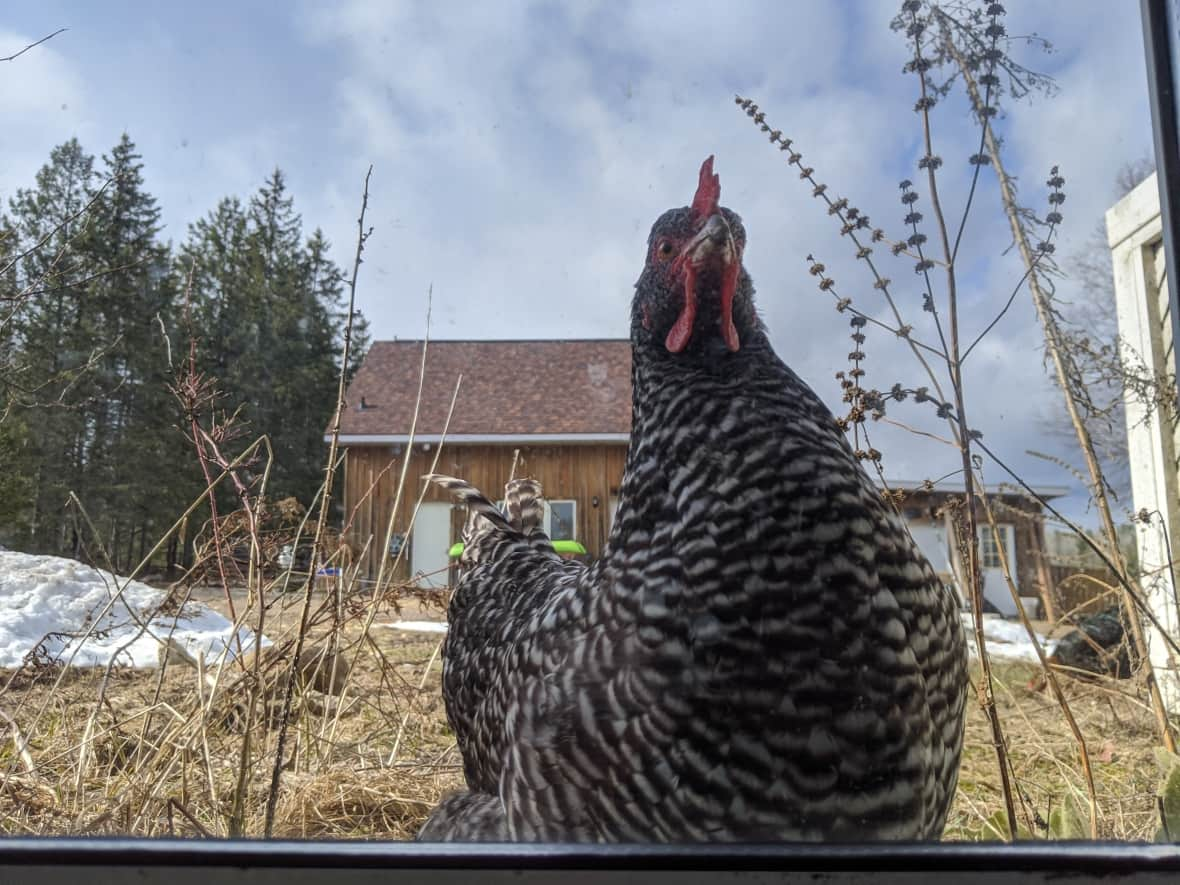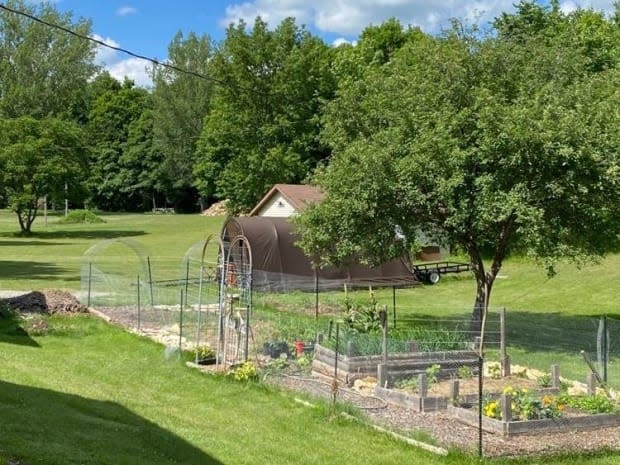Outlawed chickens: Rural Ontario residents confused by strict bylaws

Greg Robert's house in the Township of Madoc, Ont., is closer to the cows grazing across the road than it is to some of his closest neighbours.
But here, on the large rural property about 40 kilometres north of Belleville, Ont., backyard chickens are outlawed.
"I'm confounded as to why," Robert said. "Especially considering how agricultural it is."
Robert moved last year from a smaller property in the town of Pembroke, Ont., where he used to keep a few chickens, a cow and some pigs.
If they can keep chickens in downtown Toronto, why can't we? - John Stopa, Admaston/Bromley Township
Only after moving did he learn that Madoc bylaws require residents in rural zoning to own a lot measuring at least six hectares in order to keep chickens. Such a property would be roughly seven-and-a-half Canadian football fields in size.
Anything short of that threshold, and you aren't allowed to have a single laying hen.
Even as the City of Toronto moves toward a permanent urban hen program, some rural municipalities in eastern Ontario don't allow residents to keep any backyard birds.
A patchwork of bylaws across the region means chickens may be permitted in one township but outlawed in the next, and some residents in the strictest municipalities are pushing for change.

People more likely to 'grow lawns and not food'
Looking for solutions, Robert renewed an online petition posted nearly three years earlier calling on the township to allow residents "to raise a small number of backyard chickens/hens, subject to reasonable controls and regulations."
Although the township is only home to slightly more than 2,000 residents, the petition had accrued more than 1,100 signatures as of publication.
The original petition was started by Susan Hetherington in April 2020, shortly after she moved to Madoc for the "specific reason" of keeping a few chickens and some rabbits.
Hetherington's property is large enough to house a barn, but at about one hectare it still falls well below the minimum size needed to keep chickens.
"It's all farmland out where we are," she said. "It's ridiculous."

For supporters of the policy, backyard chickens bring numerous benefits. With food costs rising at the fastest annual rate in decades, chickens may represent an opportunity to save some money on eggs.
For Robert, they would also return a measure of self-sufficiency and control over his food supply — something supporters say is especially valuable in rural communities where grocery options are often limited.
"We have a propensity now to grow lawns and not food," Robert said. "We could all be a little more self-sufficient, a little less reliant on groceries."
But others are more skeptical.
Long-time Madoc resident Shannon Banfield said she doesn't have a problem with the hens, but in her experience they can get "a little out of hand."
Banfield said a neighbour once kept about 30 chickens on the property, and the birds roamed into her yard to dig up her flower bed.
Banfield is concerned more liberal bylaws may lead to less compliance — and in turn cause more conflicts between neighbours.
She said she'd be open to a bylaw amendment if it were enforced by something more than neighbour complaints, such as a registration system for the birds.
Mayor of the Township of Madoc, Loyde Blackburn, did not respond to a request for comment.
Spectrum of bylaws across the region
Matt Walker ran for mayor of the Township of Madoc in the last election (and lost) on a platform opposing what he views as overly restrictive bylaws — including rules around chickens.
Walker said bylaws across eastern Ontario range from "reasonable restrictions" to outright chicken bans.
"You just open the map up and [bans] are there," he said.
The bylaws operate on a complaints-based system, Walker said, which means some residents may choose to flout the rules entirely, but it would take just one complaint for authorities to crack down.
On one end of the bylaw spectrum, the nearby Township of North Frontenac provides a specific zoning exemption for backyard chickens, allowing up to six hens for a property of between 0.2 and 1.2 hectares — and more for larger lots.
In nearby townships without such exemptions, some residents are pushing to get minimum property requirements lowered.

John Stopa, a clergy member in the Township of Admaston/Bromley located about 55 kilometres south of Pembroke, approached every candidate in the latest municipal election to ask about their stance on backyard chickens.
Stopa hopes to keep about five hens on his property of more than half a hectare. The township's current bylaws, he said, require him to have two hectares before he would be allowed to keep chickens.
"I think what they had in mind when they were thinking chickens was somebody with a chicken farm," he said. "If they can keep chickens in downtown Toronto, why can't we?"
Admaston/Bromley is currently conducting a survey to capture public opinion on the issue.
Rural property minimums 'unreasonable'
Urban municipalities across Canada are engaged in a similar debate. Bylaws in urban centres range from permissive, as in Victoria where backyard chickens have long been allowed, to restrictive, as in Ottawa where the birds are banned.
Wanda Martin, a nursing professor at the University of Saskatchewan who has studied backyard chickens, said the birds are more likely to be intrusive for neighbours in cities than in rural areas.
"When you've got an acre or more, it seems unreasonable that a person wouldn't be able to put up a coop," she said.
According to her research, Martin said opposition in cities is often due to a misunderstanding about the ways in which small urban hen setups differ from larger agricultural chicken operations. People may also not trust their neighbours to take proper care of the birds, she said, leading to noise and odour concerns.
More "dogmatic" opposition, she said, may stem from the conviction that chickens belong in the country — not the city.
But as Robert has learned since moving to Madoc, even in the country chickens may be outlawed. He said he will likely draft a proposal to Township of Madoc council requesting a slight revision to existing bylaws.
"It's not going to tip the scales in my favour for being self-sufficient or homesteading," Robert said. "But it is nice to know where some of your food comes from, to be able to take a little bit of control back."


